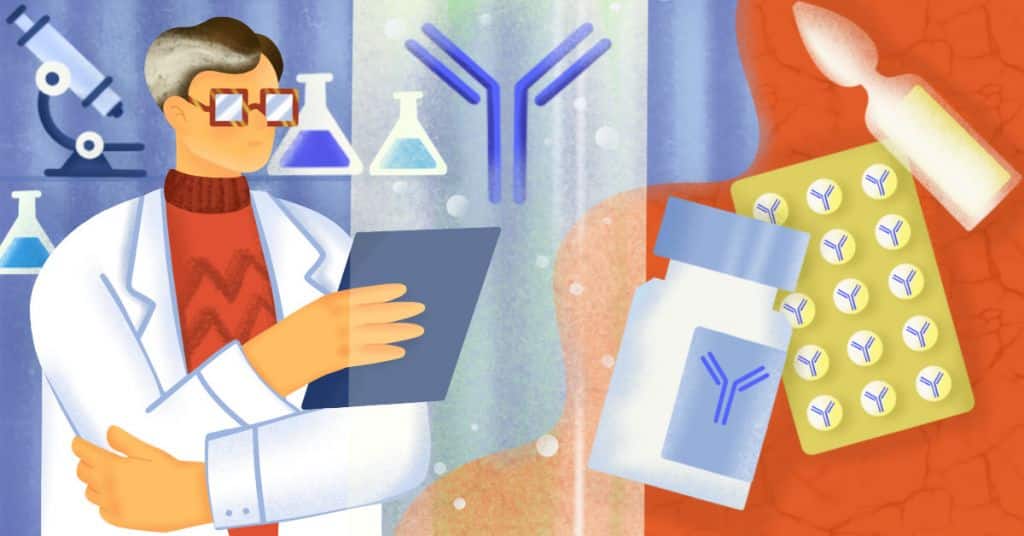The EU recently added two drugs to its list of approved Covid-19 treatments. Yet with vaccines often in the spotlight, treatment options available to doctors remain few.
Earlier this month, the European Commission gave its stamp of approval to two antibody treatments for Covid-19: regdanvimab from the South Korean firm Celltrion Healthcare, and a blend of two antibodies called casirivimab and imdevimab developed by Roche and Regeneron.
The two treatments join Gilead’s remdesivir (Veklury) as the only EU-approved medicines for Covid-19. Both regdanvimab (Regkirona) and casirivimab/imdevimab (Ronapreve) are designed to treat patients with mild Covid-19 who have a high risk of the condition worsening. Ronapreve, which was authorized by the FDA with the brand name Regen-Cov last year, is also labeled for the prevention of Covid-19 in people that have recently had contact with an infected individual.
In addition, the EMA is processing market approval applications for six other Covid-19 treatments. Examples include the antibody drugs sotrovimab, bamlivimab, and etesevimab, which were greenlit by the FDA earlier this year.
These approvals of Covid-19 treatments come months later than those of Covid-19 vaccines. Since March 2021, there have been four approved vaccines in the EU, and a number of these approvals have since been expanded for use as booster shots. More candidates are being considered for approval, including vaccines from Novavax and Sanofi/GSK.
Treatment developers say the hope put on vaccines may have motivated early funding choices that channeled resources away from therapies.
“Vaccines are expected to eradicate a virus in the best case,” said Christian Setz, Managing Director of the German biotech ImmunoLogik, which is developing a broad-spectrum antiviral that works against many coronaviruses. “Therefore, of course, a lot of funding was initially allocated to the development of a vaccine.”
“On the other hand, much less money has gone into the development of drugs, which of course clearly slows down development.”
Earlier in the year, low Covid-19 case numbers created problems for clinical trials of Covid-19 treatments. In March, for example, Roche pulled a Covid-19 treatment trial in the UK after a national mass vaccination campaign drove down infections dramatically.
However, the pandemic is far from over, and renewed Covid-19 outbreaks this winter are causing a healthcare crisis in many European countries. Another concern is that as the virus mutates, the protection of the vaccines will wane. If that’s the case, the gap in developing treatments can lead to further lives lost.
“I think the healthcare world is realizing we need resources for both [vaccines and treatments],” said Chris Miller, CSO of Canadian biotech SaNOtize. The company is developing a nasal spray based on nitric oxide that kills viruses in the nose and mouth.
“We are working very hard to prove to the world that [our treatment] is a significant tool in the overall tool belt to prevent and treat early Covid-19,” Miller added.
A similar approach — a broad-spectrum antiviral in the form of a nasal spray — has been taken by Leyden Labs in the Netherlands, which raised a €40M Series A funding round in March to advance its product.
“Our team is particularly interested in approaches that bridge the gap between broad measures, such as social distancing, and narrow measures that may be effective against a single or a few viral variants, such as developing a vaccine,” said a Leyden Labs representative.
There are scientific reasons why vaccine candidates are easier to field than treatments. According to Raz Jelinek, Vice President and Dean for Research and Development at Israel’s Ben Gurion University, designing treatments often requires more knowledge of the disease process than vaccines. In the case of Covid-19, “it is harder to figure out the exact pathological mechanisms of the virus,” he explained.
Jelinek’s startup Imm-Balance Therapeutics is developing a probiotic treatment based on kefir, a popular Eastern European yoghurt-type drink. According to very early preclinical data in mice, the treatment has the potential to prevent deadly inflammatory reactions seen in severe Covid-19 and bacterial infections.
Targeting inflammation rather than the virus itself is also the focus of many other Covid-19 treatments in use, such as dexamethasone and baricitinib.
Another important issue in developing treatments is the scarcity of reliable biomarkers for predicting who will develop a severe form of Covid-19. There is no lack of leads—anything from blood levels of inflammatory proteins to non-coding RNA molecules has been studied as possible biomarkers—but few have so far withstood scientific testing.
A recent player in the Covid-19 biomarker scene is Swiss biotech GeNeuro, which develops treatments targeting viral genes that are normally hidden in our genome, but are expressed when a disease breaks out. In April, the company published a study linking the expression of these genes with severe Covid-19.

GeNeuro plans to target both severe Covid-19 cases and the longer-term consequences of the disease — known as ‘long Covid’ — with an antibody drug it has been developing for the treatment of multiple sclerosis and other neurodegenerative diseases.
Many treatments for Covid-19 acquired a bad reputation early in the pandemic, in part because many were tried with mixed results. One promising approach was the transfusion of plasma from recovered Covid-19 patients, but the hype later fizzled as it wasn’t matched by the evidence.
Companies developing Covid-19 treatments continue to hit clinical setbacks. A recent example is Molecular Partners in Switzerland, whose protein drug recently failed to achieve objectives in an ongoing phase III trial in hospitalized Covid-19 patients. The drug, co-developed by Novartis, will continue in a phase II/III trial to see if it can prevent early-stage Covid-19 from worsening.
Nevertheless, studies continue; a large study in the US that evaluates several promising repurposed drug candidates found hints that the antidepressant fluvoxamine could cut hospitalizations in Covid-19 patients. And two pills, one from Pfizer and another from Merck and Ridgeback Therapeutics, are expected to get FDA approval after promising phase III results.
Despite the setbacks, there is a sense of optimism among researchers.
“We hope that a working Covid-19 treatment will be available soon to restore our ability to hug our loved ones again or see a football match again safely,” said Leyden Labs’ spokesperson. “Proactive approaches will be most useful in preventing future pandemics from impacting us as drastically as Covid-19.”
This article was first published in May 2021 and has since been updated with recent developments in Covid-19 treatments. rnrnCover image via Elena Resko. Data visualization via Jon Smith. Inline image via Shutterstock





